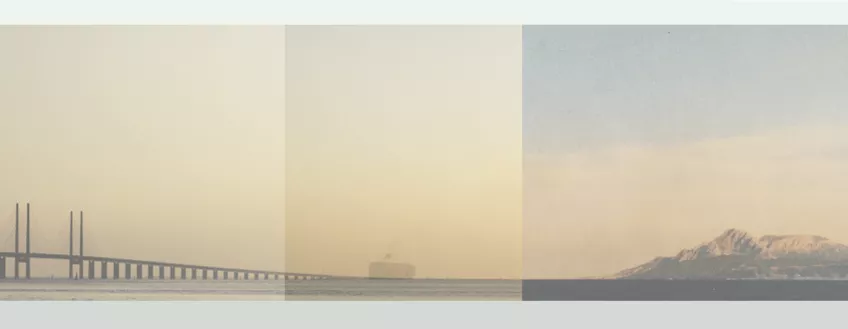Mobile bodies, travelling theories
Öresund / Gibraltar
A webinar series on borderland formation at Europe’s antipodes
14 september - 7 december 2022
Centrum för Öresundsstudier gav en serie digitala seminarier om gränser, gränsland och rörelser över Öresund och Gibraltar. Serien arrangerades av William Kutz i samarbete med CORS och Think Tanger. Serien bestod av sju digitala tillfällen där vi undersökte rörelser och gränser mellan Öresund och Gibraltar, och hur de förhåller sig till varandra. Se hela programmet på denna sida, och läs den engelska beskrivningen här nedanför. Flera av seminarierna spelades in, du finner information om hur du får tillgång till videorna på program-sidan.
The seminar series underscored the multiplicity of bordering perspectives and the plasticity of border trajectories as a way to construct alternative imaginaries of borderland formation as they pertain to Scandinavian and Mediterranean contexts. During each meeting, two contributors presented their work, with one local and one international guest respondent commenting on the respective issues raised during the talks. This was followed by a moderated discussion among wider audience members and speakers. A final session was dedicated to considering the creation of a borderland working group linking CORS to other research groups.
Speakers
Medine Altiok | Pei-Sze Chow | Marie Northrup Christensen | Mouna Deghali | Eugénie Denarnaud | Lisa Babette Diedrich | Cecilia Fredriksson | Hicham Gardaf | Sarah Green | Annette Hill | William Kutz | Gini Lee | Marco Mogiani | Nina Grønlykke Mollerup | Randa Maroufi | Kristian Olesen | Lina Olsson | Christer Persson | Maria Hellström Reimer | Mathilda Rosengren | Kristine Samson | James W. Scott | Christophe Sohn | Burcu Yigit Turan
About the series
The seminar series is a starting point for a multi-sited, interdisciplinary investigation into the territory, place-making, and politics of borderland formation at the peripheries of Europe. Focusing on cross-border regions in Scandinavia (Öresund) and the Mediterranean (Gibraltar), the meetings will bring together researchers, artists, and regional practitioners to debate, characterise and visualise these spaces from a decidedly comparative perspective –
across cultural contexts, geographical scales, and cartographic perspectives. The interconnections between different voices, images and analyses aims to generate new understandings of the ways borderlands are constituted and politicised as dynamic environments in the making. To do so, several overarching questions will be taken up over
the course of the seminar series:
- How is borderland formation constituted? What tools and techniques can we harness to map the complexity of these territorial spaces?
- What types of material resources, social practices and symbolic representations characterise the territorial identity of each borderzone as relatively stable, coherent locations?
- How are ordinary cross-border relations and bordering tendencies negotiated or contested by political actors at different territorial scales?
- In what ways do these circulations and practices shape one’s sense of place and belonging?
- How might such tendencies impact different articulations of territorial citizenship, social cohesion and political solidarity among social groups in the respective regions?
Putting these observations into conversation with each other, the seminar aims to pluralize the diversity of actors typically understood to perform the “border work” defining each region; to consider novel forms of hybridity, porosity, dependency and engagement alongside more conventional demarcations of geopolitical frontiers; and finally, to question the presumed legitimacy and utility of discourses that seek to naturalise region-building efforts
and their attendant outcomes.
Kontakt
Johanna Rivano Eckerdal
Föreståndare
johanna [dot] rivano_eckerdal [at] kultur [dot] lu [dot] se
+46 46 222 30 35


